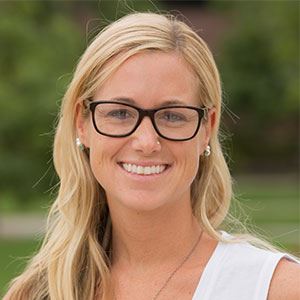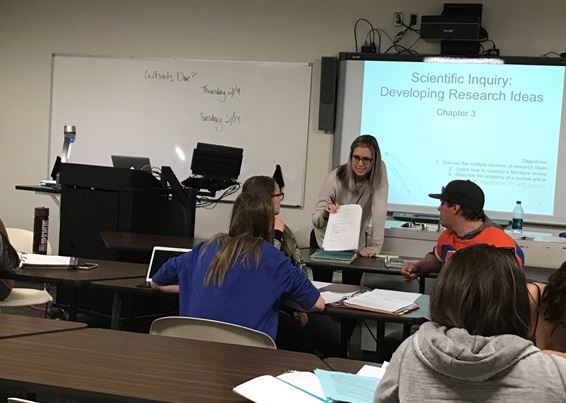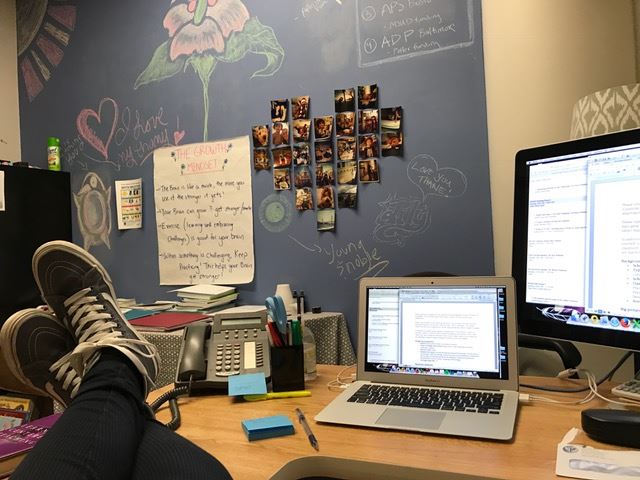 School name: Metropolitan State University of Denver
School name: Metropolitan State University of Denver
Type of school: MSU Denver is a large public 4-year teaching university (19,800 students enrolled). We are a commuter campus and have a nontraditional and diverse student body. What I am most proud of at this institution is our commitment to diversity. “INSIGHT Into Diversity” magazine recognized MSU Denver as one of 10 Diversity Champion colleges and universities nationwide for our unyielding commitment to diversity and inclusion. We are affordable, have small class sizes, 73 bachelor’s degrees and 5 master’s degrees offered.
School locale: Urban, we are in the heart of downtown Denver.
Classes you teach: I teach a range of developmental and psychology courses including: Developmental Educational Psychology, Introduction to Psychology, Child Psychology, Human Growth and Development, Adolescent Psychology, Developmental Research Methods, Cognitive Growth and Development, Senior Thesis, Teaching of Psychology. Two of my classes have a service learning component where we are paired up with the Boys & Girls Club of Metro Denver and Reading Partners as community partners. I also mentor students as teaching assistants and research assistants. My Introduction to psychology course is taught flipped and I teach classes face-to-face, hybrid or completely online.
Average class size: 20
What’s the best advice about teaching you’ve ever received?
The best advice I received was to always think about the end outcome or goal I want my student to achieve. This guides my decision-making. Sometimes the outcome I want is strictly related to learning and the content is so important it needs to be mastered. In this case if a student needs an extension on an assignment I might grant it because it’s more important for them to learn the material and the assignment works to achieve that. Other times the content is not as important and instead I want my student to be responsible, accountable, or to follow directions. Part of getting a college degree is being accountable and committed. In this case an extension would not be granted. This conscious process extends past individual students and their assignments and into the classroom. By thinking about the end outcome I want my students to achieve, I can intentionally decide how we approach material in the course.
What book or article has shaped your work as a psychology teacher?
The most influential book that has shaped my work as a psychology teacher is Maryellen Weimer's Learner-centered Teaching.
Briefly tell us about your favorite lecture topic or course to teach.
I enjoy teaching about Vygotsky’s sociocultural theory. It has it all: social interaction, active learning, language, memory, and clear application to learning that students can use to help them be better students or teachers.
 Briefly describe a favorite assignment or in-class activity.
Briefly describe a favorite assignment or in-class activity.
In Cognitive Growth and Development my students complete a service project with a community partner called Reading Partners. The project has them paired up and tutoring a K-6th grade public school student who has fallen behind in reading. My students reflect on their tutoring and connect concepts from class to their experiences.
Reading Partners (RP) is a national organization so I encourage anyone teaching development of anything to get involved. This is a great organization to partner with for a service-learning course. In my class an associate from RP comes in during the first week and does the tutor orientation for my students. Then, they pair each student up with a child who has fallen behind in reading in a Denver school (they operate in 9). The student tutors the child for one hour every week during the semester. Each week my students complete online reflection questions where they tell me what they covered in their tutoring session (RP has a great curriculum to follow) and how their experience connects with something that we learned in class that week. The make connections between their service and concepts such as Piaget’s theory, motivation, self-efficacy, reading development, information processing theory, memory and many more. Finally at the end of the semester they write a paper that details their experiences and reflects on the course content in light of those experiences.
What teaching and learning techniques work best for you?
Teaching by doing works best for me. Many of my students are studying education in hopes of becoming a teacher. I like to show students the application of cognitive educational theory by modeling a theory using it in my own teaching. Then we talk about the theory and how it was applied. I then ask them to do it. They have to show me the application either in-class through activities, or out in the field using service learning community partnerships.
 What’s your workspace like?
What’s your workspace like?
I have a large blue chalkboard wall that is covered in student messages and pictures. I use the wall to organize my conference travel deadlines as well. My desk is small and my bookshelf is so full I need another one. I always have coffee and I have cookies or candy for students in need (not for me…most days).
Three words that best describe your teaching style.
Social
Engaging
Intentional
What is your teaching philosophy in 8 words or fewer?
Get engaged with the material and community!
What is something your students would be surprised to learn about you?
I rapped Salt n’ Peppa’s “What a Man” to my husband and our guests at our wedding reception.
What are you currently reading for pleasure?
Big Little Lies by Liane Moriarty
What tech tool could you not live without?
My iPhone calendar. Seems basic, but it organizes where I need to be and when. I even put to-do tasks in there so they become a scheduled priority.
What is your hallway chatter like? What do you talk to colleagues about most (whether or not it is related to teaching/school)?
Recently my hallway chatter has been political. It is hard to avoid. I am a strong advocate for social justice issues and I am excited and committed to energizing people to work towards the changes they want to see in our communities. More enjoyably I talk with my colleagues often about our children! I have a one-year-old daughter. It has been really amazing to connect with my co-workers and students about being a parent.
PSYCHSESSIONS UPDATE: Listen to Bethany talk to about work-life balance, pervasive mommy-guilt, and the partial solution of double-dipping method. The interview closes with her new project, a blend of civic engagement and service learning, leading to the American Democracy Project.
https://psychsessionspodcast.libsyn.com/e028-bethany-fleck-role-model-high-achieving-double-dipping-and-mommy-guilt
